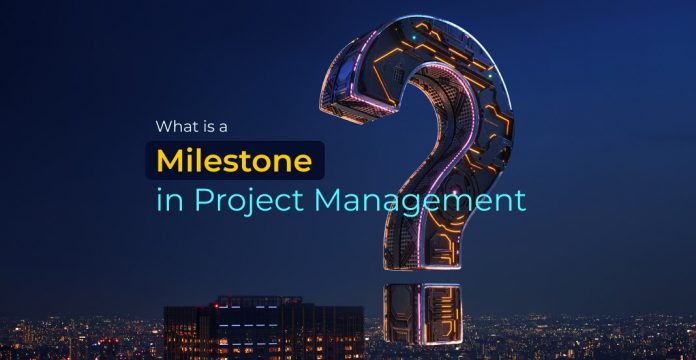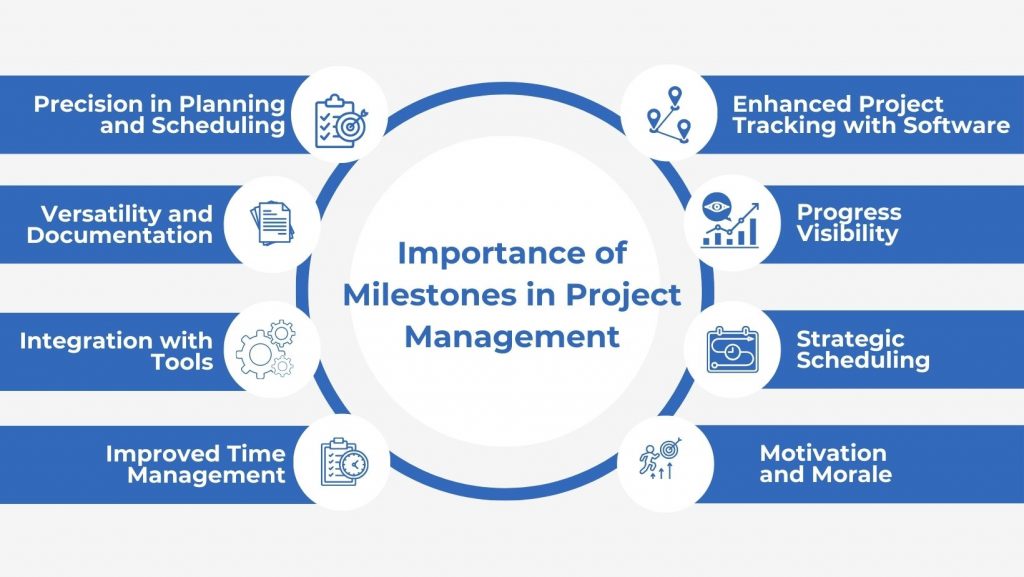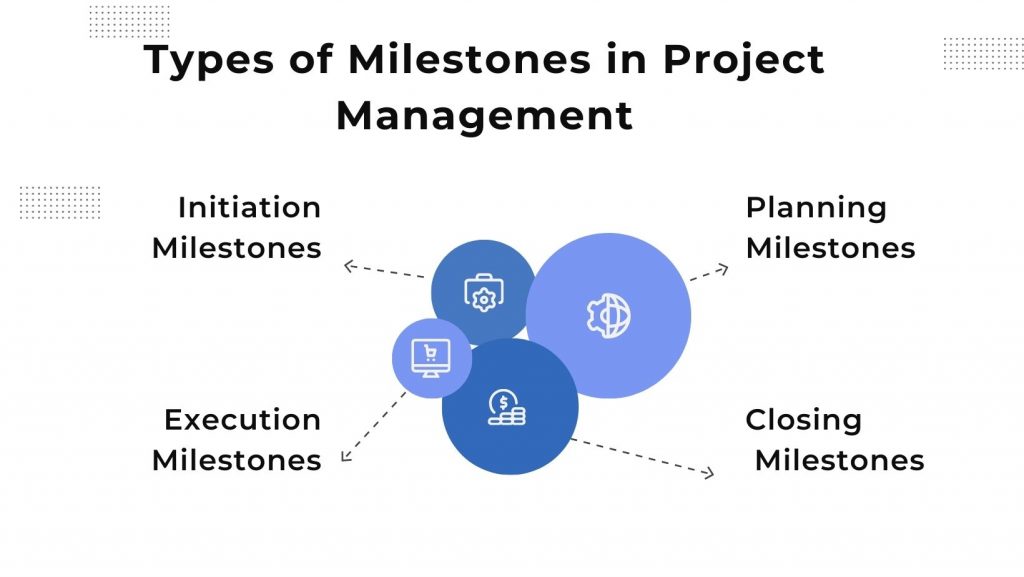
Navigating the complexities of project management requires not just a clear roadmap but also markers that signify critical achievements along the way. The milestones in project management are critical points that encapsulate progress, align focus, and provide teams with palpable goals.
In project management, milestones are more than mere checkpoints; they’re powerful tools that, when effectively leveraged, can make the difference between a project’s success and its shortfall.
In this article, we delve into the essence of milestones within project management, offering a clearer understanding and practical examples to enhance the planning and execution of your projects.
Watch this Video on What Are Project Milestones
What is a Milestone in Project Management?
At its core, a project milestone is a pivotal moment or event within the trajectory of a project. Think of it as a reference point that signifies a significant achievement, whether it’s the commencement or conclusion of a project, the end of a substantial phase, or the production of vital deliverables. It’s not just a date on a calendar; it’s a symbol of progress, a clear indication of a job well done or a phase concluded.
Milestones serve as guiding stars for project teams. They clarify the project’s objectives and the necessary steps to achieve them. By spotlighting these major progress junctures, milestones facilitate better coordination amongst team members as tasks dissect a colossal project into digestible chunks, and milestones partition project phases into more strategic and focused segments.
This division empowers project managers to plan better, schedule, and oversee their projects, ensuring a smooth sail toward the project’s end goal.
Significance of Milestones in Project Management
Milestones, in project management, are more than just markers on a timeline. They encapsulate the essence of progress, serving as pivotal checkpoints that illuminate the road ahead and reflect upon the journey traveled.
Here are the key benefits of milestones in project management:
Precision in Planning and Scheduling
Milestones facilitate a nuanced understanding of the project’s timeline. By demarcating significant events or dates, they enable project managers to estimate completion times more accurately, ensuring that projects remain on schedule.
Versatility and Documentation
The adaptable nature makes milestones integral to numerous project documents, from the project schedule to the project charter and plan. This versatility ensures that the entire team is on the same page regarding critical junctures in the project.
Integration with Methodologies and Tools
Milestones are seamlessly woven into methodologies like the critical path method (CPM) and are pivotal in tools such as Gantt charts. These tools utilize milestones to delineate major scheduling intervals, thus refining the project’s structure.
Improved Time Management
By breaking the project timeline into intervals using milestones, project managers can pinpoint and manage slack times more efficiently. This segmentation offers a more granular view of the project’s flow, making it easier to track and control progress.
Enhanced Project Tracking with Software
Modern project management software capitalizes on milestones to fortify project schedules. Features like online Gantt charts incorporate milestones to streamline phases, subtasks, and dependencies, offering an elevated project tracking experience.
Progress Visibility
Since milestones are associated with specific dates or timeframes, they provide a crystal-clear view of the project’s evolution. They act as barometers, indicating how much has been achieved and what lies ahead.
Strategic Scheduling
The inception of a project can be harmonized using milestones. By estimating the time required for various tasks, milestones can be set, thereby projecting potential completion dates for the entire project.
Motivation and Morale
Beyond the functional role, milestones play a psychological role as well. Each milestone reached is an accomplishment, a testament to the team’s dedication and effort. Recognizing and celebrating these moments can significantly bolster team motivation, ensuring sustained enthusiasm for upcoming tasks.
Milestones are the lighthouses of project management. They not only guide the way but also remind teams of the shores they’ve crossed, instilling confidence and direction for the journey ahead.
Types of Milestones
In the complicated tapestry of project management, milestones are distinct markers that denote significant events or achievements. Different projects, depending on their nature and complexity, may require various types of milestones. From conceptualization to completion, there are initiation milestones that mark the beginning, developmental milestones that represent progress and transformation, and culminating milestones signaling the project’s end.
Initiation Milestones
- Assembling a Project Team: Before the gears of the project start turning, a competent team equipped with the necessary skills and experience is assembled.
- Project Kick-off Meeting: A seminal meeting where stakeholders, the project client, and the team converge to set the project’s goals and align their visions.
- Approval of Project Charter: A concise presentation of the project, its objectives, scope, and the stakeholders involved, the charter’s approval acts as a green light for project commencement.
- Securing Resources: At this juncture, the critical resources – financing, equipment, or other assets – are procured, setting the stage for the project’s next phases.
Planning Milestones
- Scope Definition: Thoroughly detailing the project’s ambit, highlighting its goals, deliverables, and tasks.
- Project Cost Estimation: Leveraging historical data and granular costing, an estimation of the project’s financial requirements is made.
- Budget Formulation: With cost estimates in hand, a comprehensive budget mapping out all expenses from inception to closure is drafted.
- Schedule Creation: Crafting a timeline encapsulating every project phase, task, start, and end date.
- Completion & Approval of Project Plan: The project’s blueprint, the plan, once finalized, is then presented for stakeholder or sponsor approval, signifying their endorsement.
Execution Milestones
- Commencement of Execution Phase: The hands-on phase where teams dive into the tasks, working towards the project’s deliverables.
- Production of Key Deliverables: Throughout the project, several pivotal deliverables are realized, marking significant progress points.
- Completion of Critical Tasks: These tasks, identified through the critical path, are indispensable for the project’s successful culmination.
- Achieving Project Goals: As the project forges ahead, its overarching goals and objectives are met, each a milestone in its own right.
Closing Milestones
- Drafting a Project Punch List: Especially prevalent in construction, this list enumerates the final tasks that need wrapping up before completing the project.
- Stakeholder Approval for Project Closure: The ultimate seal of completion, it’s the client or project sponsor’s nod that officially concludes the project, paving the way for final documentation and team dispersal.
These delineated milestones, while universally applicable across diverse industries, can be tailored and modified by project managers to align with the unique nuances and demands of their specific projects.
Project Milestones Examples
Project milestones can vary depending on the type, scale, and complexity of the project. However, they generally signify significant achievements or points in a project’s timeline.
Here are some common examples of project milestones across various industries and project types:
Project Initiation Approval
In the embryonic stage of any project, gaining approval to proceed is a critical step. This milestone marks the official commencement of the project. It signifies that all the preliminary research, discussions, and planning have been concluded, and the stakeholders are aligned and committed to moving forward.
This approval often comes after presenting a project charter or a project proposal, and it serves as a green light for the teams to start the actual work.
Completion of the Design Phase
For projects that involve designing, whether a physical product, a digital interface, or an infrastructure project, the conclusion of the design phase is a notable milestone. This indicates that the conceptualization is complete and the blueprints are ready.
It’s a transition from ideation to execution. All designs, sketches, and prototypes have been reviewed, revised, and finalized, preparing for production or implementation.
Procurement of Essential Resources
For projects dependent on specific resources—be it raw materials, software licenses, or specialized personnel—securing these resources is a momentous occasion. It’s a milestone that ensures the project can proceed without interruptions due to a lack of essential tools or materials.
The achievement of this milestone often follows a meticulous phase of vendor negotiations, quality checks, and budgeting.
Midway Review
The midway review is a reflective milestone that usually occurs when a project is approximately half completed. It offers a chance for the project team to assess what has been accomplished so far and what lies ahead.
This is an opportunity for introspection, recalibration, and strategic realignment, ensuring that the project remains on track and that any potential issues are addressed before the final stretch.
Completion and Delivery
The most anticipated milestone in any project is its conclusion. This milestone signifies that all tasks and objectives outlined in the project scope have been fulfilled. The final product, service, or solution is ready for delivery or deployment.
Celebrating this milestone acknowledges the team’s hard work and dedication while preparing them for post-project activities like feedback collection and project retrospectives.
In the vast landscape of project management, milestones are like signposts. They not only mark progress but also offer moments of reflection, celebration, and anticipation for the next steps.
Whether they indicate the beginning, middle, or end, these examples showcase the diverse and critical roles milestones play in steering a project to its successful completion.
Conclusion
A milestone in project management is a pivotal marker, signifying significant events or achievements in a project’s lifecycle. These milestones not only provide clarity and structure but also offer a means to measure progress and keep teams motivated.
For those looking to enhance their project management skills, the Invensis Learning PMP certification is an excellent way to upskill as a guiding light in the complex journey of project execution; understanding and effectively utilizing milestones is crucial for project managers aiming for timely and successful project completion.
















